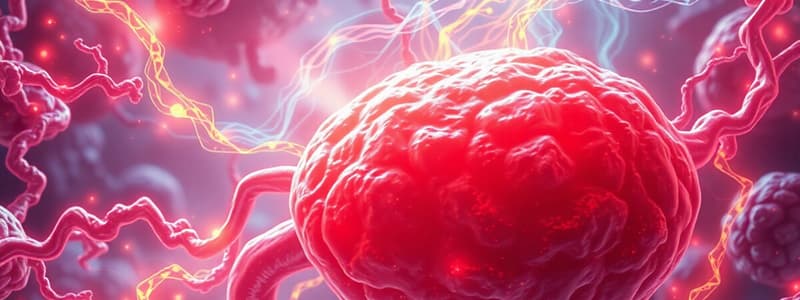Podcast
Questions and Answers
What is the first step in breaking down fatty acids for use as fuel in cells?
What is the first step in breaking down fatty acids for use as fuel in cells?
- Mitochondrial beta oxidation
- Activation to fatty acyl-CoA (correct)
- Conversion to glycerol
- Transport into mitochondria
Where does glycerol from lipolysis enter after being processed by the liver?
Where does glycerol from lipolysis enter after being processed by the liver?
- Fatty acid synthesis
- Lipogenesis
- Glycolysis or gluconeogenesis (correct)
- Krebs cycle
What does lipolysis generate apart from glycerol?
What does lipolysis generate apart from glycerol?
- Ketone bodies
- Fatty acids (correct)
- Amino acids
- Glucose
Which pathway is activated by certain metabolic circumstances to use glycerol in the liver?
Which pathway is activated by certain metabolic circumstances to use glycerol in the liver?
Which statement is correct about fatty acid catabolism?
Which statement is correct about fatty acid catabolism?
What determines whether glycerol enters glycolysis or gluconeogenesis in the liver?
What determines whether glycerol enters glycolysis or gluconeogenesis in the liver?
What is the final step in the process of fatty acid catabolism?
What is the final step in the process of fatty acid catabolism?
Which of the following best describes the role of fatty acids in tissues?
Which of the following best describes the role of fatty acids in tissues?
What role do triglycerides serve in the body?
What role do triglycerides serve in the body?
Where is fat primarily stored in the body?
Where is fat primarily stored in the body?
What is the primary method by which triglycerides are mobilised during energy needs?
What is the primary method by which triglycerides are mobilised during energy needs?
Which statement accurately describes ketone bodies?
Which statement accurately describes ketone bodies?
Which of the following is the most energy-dense macronutrient?
Which of the following is the most energy-dense macronutrient?
How is fat metabolism regulated in the body?
How is fat metabolism regulated in the body?
What is lipogenesis?
What is lipogenesis?
Adipose tissue can be divided into which types based on function?
Adipose tissue can be divided into which types based on function?
Which of the following is true regarding fat as a fuel source?
Which of the following is true regarding fat as a fuel source?
Which type of tissue stores most of the body's fat?
Which type of tissue stores most of the body's fat?
What is the primary product of the mitochondrial beta oxidation of fatty acids?
What is the primary product of the mitochondrial beta oxidation of fatty acids?
Which component is essential for the transport of fatty acids into the mitochondria for oxidation?
Which component is essential for the transport of fatty acids into the mitochondria for oxidation?
How many cycles of beta oxidation are required to completely oxidize palmitoyl-CoA?
How many cycles of beta oxidation are required to completely oxidize palmitoyl-CoA?
What is the theoretical maximum yield of ATP from one molecule of palmitate during catabolism?
What is the theoretical maximum yield of ATP from one molecule of palmitate during catabolism?
Which electron carriers are produced during fatty acid beta oxidation?
Which electron carriers are produced during fatty acid beta oxidation?
Which step in fatty acid oxidation begins the process?
Which step in fatty acid oxidation begins the process?
What is the function of FAD as it relates to beta oxidation?
What is the function of FAD as it relates to beta oxidation?
Which metabolite is needed for the TCA cycle to oxidize acetyl-CoA?
Which metabolite is needed for the TCA cycle to oxidize acetyl-CoA?
What happens to the fatty acyl-CoA during beta oxidation?
What happens to the fatty acyl-CoA during beta oxidation?
Which of the following is a product of the complete oxidation of one molecule of fatty acid?
Which of the following is a product of the complete oxidation of one molecule of fatty acid?
What is required for fatty acid oxidation to occur efficiently?
What is required for fatty acid oxidation to occur efficiently?
What happens when there is an excess of acetyl CoA from fatty acid oxidation?
What happens when there is an excess of acetyl CoA from fatty acid oxidation?
Which compound is primarily responsible for inhibiting the uptake of acyl CoA in the fed state?
Which compound is primarily responsible for inhibiting the uptake of acyl CoA in the fed state?
In terms of location, where does fatty acid synthesis primarily take place?
In terms of location, where does fatty acid synthesis primarily take place?
Which of the following is NOT a reducing equivalent used in fatty acid synthesis?
Which of the following is NOT a reducing equivalent used in fatty acid synthesis?
What is the primary purpose of the TCA cycle in relation to acetyl CoA?
What is the primary purpose of the TCA cycle in relation to acetyl CoA?
Which statement best describes the role of ketone bodies?
Which statement best describes the role of ketone bodies?
What metabolic pathway do acetyl CoA and oxaloacetate enter in the presence of sufficient carbohydrates?
What metabolic pathway do acetyl CoA and oxaloacetate enter in the presence of sufficient carbohydrates?
Which of these components is primarily linked to the activation of fatty acids for breakdown?
Which of these components is primarily linked to the activation of fatty acids for breakdown?
What is the primary function of acyl-CoA synthetases in fatty acid catabolism?
What is the primary function of acyl-CoA synthetases in fatty acid catabolism?
Why is the transport of long chain fatty acyl-CoA into the mitochondria necessary?
Why is the transport of long chain fatty acyl-CoA into the mitochondria necessary?
What role does carnitine play in fatty acid catabolism?
What role does carnitine play in fatty acid catabolism?
Which enzyme is responsible for the transfer of the acyl group to carnitine?
Which enzyme is responsible for the transfer of the acyl group to carnitine?
In the context of fatty acid catabolism, what occurs during the 'priming' step?
In the context of fatty acid catabolism, what occurs during the 'priming' step?
What happens to acyl-carnitine once it is transported into the mitochondria?
What happens to acyl-carnitine once it is transported into the mitochondria?
Which of the following statements about the carnitine shuttle is true?
Which of the following statements about the carnitine shuttle is true?
Which of the following enzymes is located on the outer mitochondrial membrane?
Which of the following enzymes is located on the outer mitochondrial membrane?
What is the result of the hydrolysis of pyrophosphate in the activation of fatty acids?
What is the result of the hydrolysis of pyrophosphate in the activation of fatty acids?
Why is the process of fatty acid activation considered endergonic?
Why is the process of fatty acid activation considered endergonic?
What is the primary source of fuel for most organs?
What is the primary source of fuel for most organs?
In the fed state, the source of fatty acids primarily comes from which of the following?
In the fed state, the source of fatty acids primarily comes from which of the following?
What role does hormone-sensitive lipase play in lipid metabolism?
What role does hormone-sensitive lipase play in lipid metabolism?
What happens to fatty acids during lipolysis?
What happens to fatty acids during lipolysis?
Which factor triggers the activity of hormone-sensitive lipase?
Which factor triggers the activity of hormone-sensitive lipase?
What is the role of lipoprotein lipase in fatty acid metabolism?
What is the role of lipoprotein lipase in fatty acid metabolism?
How do non-esterified fatty acids (NEFA) travel in circulation?
How do non-esterified fatty acids (NEFA) travel in circulation?
What is a function of fatty acids beyond serving as a fuel source?
What is a function of fatty acids beyond serving as a fuel source?
During which state are non-esterified fatty acids primarily released from adipose tissue?
During which state are non-esterified fatty acids primarily released from adipose tissue?
What role do fatty acids play in cell membranes?
What role do fatty acids play in cell membranes?
Flashcards
Lipolysis
Lipolysis
The process of breaking down stored fat (triglycerides) into free fatty acids and glycerol. It is regulated by hormones like insulin, glucagon, and adrenaline.
Hormone-sensitive lipase (HSL)
Hormone-sensitive lipase (HSL)
A hormone-sensitive enzyme found in adipose tissue that breaks down triglycerides into free fatty acids and glycerol for energy production.
Lipoprotein lipase
Lipoprotein lipase
An enzyme found on the surface of blood vessel lining (endothelium) that breaks down triglycerides in lipoproteins (like chylomicrons and VLDL) into free fatty acids and glycerol.
Non-esterified fatty acids (NEFA)
Non-esterified fatty acids (NEFA)
Signup and view all the flashcards
Albumin
Albumin
Signup and view all the flashcards
Gluconeogenesis
Gluconeogenesis
Signup and view all the flashcards
Glycolysis
Glycolysis
Signup and view all the flashcards
Beta-oxidation
Beta-oxidation
Signup and view all the flashcards
Fatty acyl-CoA
Fatty acyl-CoA
Signup and view all the flashcards
TCA cycle (Krebs cycle)
TCA cycle (Krebs cycle)
Signup and view all the flashcards
Acetyl-CoA
Acetyl-CoA
Signup and view all the flashcards
Mitochondria
Mitochondria
Signup and view all the flashcards
What is the main form of stored fat in the body?
What is the main form of stored fat in the body?
Signup and view all the flashcards
Where is fat stored in the body?
Where is fat stored in the body?
Signup and view all the flashcards
What is lipogenesis?
What is lipogenesis?
Signup and view all the flashcards
What is lipolysis?
What is lipolysis?
Signup and view all the flashcards
What is beta-oxidation?
What is beta-oxidation?
Signup and view all the flashcards
What are ketone bodies?
What are ketone bodies?
Signup and view all the flashcards
Why is fat an efficient energy source?
Why is fat an efficient energy source?
Signup and view all the flashcards
What is the role of the liver in lipid metabolism?
What is the role of the liver in lipid metabolism?
Signup and view all the flashcards
Why do muscles store fat?
Why do muscles store fat?
Signup and view all the flashcards
What is the importance of fat as an energy store?
What is the importance of fat as an energy store?
Signup and view all the flashcards
Carnitine
Carnitine
Signup and view all the flashcards
ATP
ATP
Signup and view all the flashcards
TCA Cycle
TCA Cycle
Signup and view all the flashcards
Oxidative Phosphorylation
Oxidative Phosphorylation
Signup and view all the flashcards
FADH2
FADH2
Signup and view all the flashcards
NADH
NADH
Signup and view all the flashcards
ATP Yield from Palmitate Oxidation
ATP Yield from Palmitate Oxidation
Signup and view all the flashcards
Fatty Acid Activation
Fatty Acid Activation
Signup and view all the flashcards
Fatty Acid Transport into Mitochondria
Fatty Acid Transport into Mitochondria
Signup and view all the flashcards
Coenzyme A (CoA)
Coenzyme A (CoA)
Signup and view all the flashcards
Carnitine Palmitoyltransferase (CPT)
Carnitine Palmitoyltransferase (CPT)
Signup and view all the flashcards
Pyrophosphate (PPi)
Pyrophosphate (PPi)
Signup and view all the flashcards
Mitochondrial Inner Membrane
Mitochondrial Inner Membrane
Signup and view all the flashcards
Pyruvate Oxidation
Pyruvate Oxidation
Signup and view all the flashcards
Oxaloacetate
Oxaloacetate
Signup and view all the flashcards
Fatty acid oxidation
Fatty acid oxidation
Signup and view all the flashcards
Pyruvate
Pyruvate
Signup and view all the flashcards
ATP (adenosine triphosphate)
ATP (adenosine triphosphate)
Signup and view all the flashcards
Citric acid cycle (TCA cycle)
Citric acid cycle (TCA cycle)
Signup and view all the flashcards
Citrate
Citrate
Signup and view all the flashcards
Ketone bodies
Ketone bodies
Signup and view all the flashcards
Succinate
Succinate
Signup and view all the flashcards
Study Notes
Fat Metabolism
- Fat metabolism encompasses the transport, storage, and mobilization of fats for use.
- Fats are transported, stored, and mobilized for use in various states (fed vs. fasted).
- Key steps of fatty acid breakdown include activation, transport into mitochondria, and mitochondrial beta oxidation.
- Ketone bodies play a crucial role in metabolism, particularly during periods of fasting when glucose availability is limited.
- Fatty acid synthesis is a crucial anabolic process, important for embryogenesis, lactation, and generating energy.
- The liver and adipose tissues are key players in fat metabolism in both breakdown and synthesis.
- Fatty acid catabolism proceeds through three steps: activation, transport, and then β-oxidation.
- The source of fatty acids depends on the nutrient status in the body (fed vs. fasted).
- Lipolysis is the breakdown of triglycerides into fatty acids and glycerol.
- Hormone-sensitive lipase regulates lipolysis, influenced by various hormones like glucagon and adrenaline.
- Glycerol can be utilized for either glycolysis or gluconeogenesis by the liver dependent on body's metabolic needs.
- The liver, by producing ketone bodies, can sustain energy provision during periods of low glucose.
- Different tissues utilize different fuels; heart and renal cortex preferentially use ketone bodies over glucose in periods of fasting to conserve glucose.
Regulation of Fat Metabolism
- Insulin plays a role in regulating fat metabolism.
- Insulin signals tissues to take up glucose and inhibit fat mobilization.
- In the absence of insulin (diabetes), the body utilizes fat as the primary fuel source, generating ketone bodies via liver.
- The breakdown of fatty acids converges on the TCA cycle, utilizing the same metabolic pathways as glucose utilization.
- During periods of fasting or low glucose levels, the liver produces ketone bodies as a fuel source for peripheral tissues including heart and muscle.
- The production of ketone bodies is crucial in the maintenance of energy needs when glucose uptake is inadequate.
- Malonyl-CoA regulates fatty acid breakdown and synthesis, inhibiting fatty acid uptake into mitochondria to promote synthesis.
- The different paths of fatty acid synthesis and breakdown allow for independent regulation of anabolic and catabolic processes.
Learning Outcomes
- Outline how fats are transported, stored, and mobilized for use in the body.
- Outline the key steps of fatty acid breakdown.
- Describe ketone bodies and their role in metabolism.
- Describe how fatty acids are synthesized.
- Explain how fatty acid breakdown and synthesis are regulated.
Digestion of Fat and Proteins
- Digestive enzymes, including lipases, aid in the breakdown of fats.
- Emulsifiers like bile salts aid fat digestion.
- The process of digestion of fats and proteins results in release of fatty acids and amino acids.
- The products are utilized as cellular fuels for body processes.
Fat Stored as Triglyceride
- Triglycerides (TAG) are the primary storage form of fat.
- They are stored mainly in adipose tissue.
- Adipose tissue is specialized for the storage of TAG and the mobilization of fatty acids.
- In pathological states or during fasting/starvation, accumulated TAG is mobilized into the body's energy pools.
- Adipose tissue provides a source of energy dense fuel during low glucose conditions.
- The liver plays a role in lipid metabolism, including the synthesis of triglycerides.
Studying That Suits You
Use AI to generate personalized quizzes and flashcards to suit your learning preferences.




